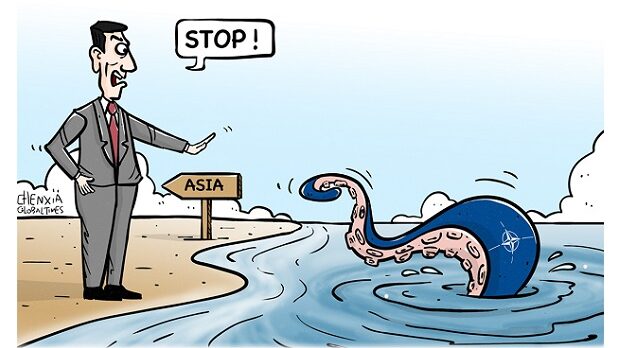In yet another desperate attempt to stop Huawei’s influence worldwide, the United States and European Union (EU) have warned Malaysia about the risks of allowing the Chinese tech giant to roll out 5G. According to the Financial Times, envoys from the U.S. and EU wrote to the government in April after a Malaysian government’s decision to review the award of a RM11 billion tender to build 5G network to Ericsson.
It’s clear who the aggressor is in this case. Exactly who gave the rights to the U.S. and Europe to issue orders, let alone threatens, the Malaysian government which company that can or cannot design and build the country’s 5G infrastructure? First of all, Malaysia is a sovereign nation, not a vassal state of the American Empire like Canada, Australia, Germany or France.
Second – the award of the 5G project to Swedish telecommunication company Ericsson in July 2021 by the previous Perikatan Nasional backdoor government lacked transparency, not to mention it was not according to proper procedures. Digital Nasional Berhad (DNB), the government-run 5G wholesaler, was itself a controversial and scandalous entity to begin with.
As the sole owner of 5G spectrum, DNB was set up by the former backdoor Prime Minister Muhyiddin Yassin to enrich his cronies – from former finance minister Tengku Zafrul to the royal house. Instead of auctioning the 5G spectrum to mobile network operators such as Maxis and Celcom, the plan to go with a SWN (single wholesale network) approach screams corruption.
The approval of DNB was shrouded in secrecy by the corrupt Muhyiddin regime during the Covid-19 pandemic, when the backdoor premier was trying to cling to power through a state of emergency, which allowed him to rule with absolute power. As a result, the Parliament was suspended and the contracts for the 5G were bulldozed without any tenders or explanations.
Third – DNB’s award of the 10-year project to Ericsson potentially involved kickbacks. Last month, Ericsson agreed to pay US$206.7 million in fine to the U.S. government for violating the anti-bribery provisions of the Foreign Corrupt Practices Act. Already, it had paid a US$520.6 million penalty in 2019 over “years long campaign of corruption” in Djibouti, China, Vietnam, Indonesia and Kuwait.
Fourth – Huawei was actually the preferred choice during Mahathir administration, till the Pakatan Harapan government was overthrown by Muhyiddin, who betrayed his own government and formed the radical and racist Perikatan Nasional regime in March 2020. On May 2019, PM Mahathir said Malaysia will make use of Huawei’s technology as much as possible.
Despite the U.S.’ claims of China’s espionage using Huawei, Mahathir visited Huawei’s Beijing office and openly declared support for the Chinese 5G technology – “We found that Huawei is very advanced. We see there is an opportunity for us, together with Huawei, to improve our capacity in the fields of communication and AI.”
Here’s the real reason behind the U.S. aggressive attacks on the Chinese tech company – Huawei’s refusal to cooperate when the spy agency NSA failed to hack and spy on 170 countries that use Huawei equipments and servers. Huawei becomes an obstacle for the NSA to “collect it all”, hindering the US agency’s efforts to spy on whomever it wants, whenever it wants.
The second reason the U.S. banned Huawei was because the Chinese company is ahead of American companies in the fifth-generation wireless, or 5G technology. To keep Huawei out of the world’s 5G networks business and to buy some time for the U.S. to catch up, all Chinese tech companies were being labelled as the bad guys whose work is to spy for the Chinese government.
Sixth – even if Huawei is spying, which is not, how do we know that Ericsson isn’t spying for the U.S. and Europe too? If both are also spyware, why should Malaysia pay more for Ericsson when Huawei can offer a cheaper solution? Not only the U.S. is spying on the enemies and even friends and allies, but the U.S. intelligence community spies on the Americans.
The latest leak of classified documents that appeared online is the clearest proof that the U.S. spy agencies, including the C.I.A., were spying on friendly countries such as Egypt, South Korea, Ukraine and the United Arab Emirates (UAE). In 2013, Edward Snowden, a former National Security Agency (N.S.A.) subcontractor, leaked “PRISM” – a spy program under the NSA.
The most explosive spying was the revelation by WikiLeaks, two years after Mr. Snowden’s leaks, that the N.S.A. had directly targeted German Chancellor Angela Merkel’s phone, which led her to tell President Barack Obama that “spying on friends is not acceptable.” In an admission, Obama phoned French President François Hollande to assure him that the spying had ended.
Seventh – Malaysia isn’t afraid of being spied. In 2018, PM Mahathir said the country was unperturbed with the allegation of Huawei spying because Malaysia has “nothing to hide” Not only he said Huawei produces better phones than America, but also said the Chinese tech company’s presence is not a major concern to the government in terms of national security.
So, why is the West so concerned – and busybody – to the extent of paranoia about Malaysia’s “national security risks” when the country isn’t bothered at all? The top priority is quality of the 5G communication network. As proven in the FIFA World Cup 2022, Qatar, Huawei has shown its capability to provide a best-in-class user experience during the 64-match tournament.
Together with Ooredoo Qatar, the official MEA telecoms operator that provided the first-ever FIFA World Cup supported by 5G technology, Huawei deployed state-of-the-art international broadcast network solutions that successfully carried live broadcasting traffic of the event globally – in eight stadiums. In the first 48 matches alone, around 533 Terabytes of mobile data had been used.
Eighth – if Malaysia had to choose, it will choose China over Europe in terms of foreign investments. Anwar’s recent trip to China had won RM170 billion investment commitments – more than €25 billion (RM123 billion) Europe threatens to withdraw. Crucially, China has been Malaysia’s largest trading partner for 13 consecutive years, while Europe is the fifth largest.
The value of trade between Malaysia and China in 2022 was about 17.1% of Malaysia’s total global trade – worth a staggering RM2.8 trillion. Total trade between Malaysia and Europe, meanwhile, was only US$216.53 billion in the same year. It’s not rocket science that the country needs China more than it needs European Union. It exported more than double palm oil to China than the EU.
Ninth – Europe remains addicted to Chinese network equipment. In 31 European countries, the Chinese tech giants supply more than 50% of 5G equipment at the end of 2022. While Huawei is no longer the leader in the smartphone business, its carrier business generated 284 billion Yuan (US$41 billion) in revenue last year, a 0.9% year-on-year rise. It is still alive and kicking.
Tenth – the U.S.’ attack on Malaysia is both surprising and significant. It shows that despite blacklisting Huawei since 2019, the U.S. has failed to defeat the company. More importantly, it demonstrates the West’s fear and frustration over the 5G manufacturer’s continue threat – even after the US imposed a “global ban“ on sales of advanced semiconductor chips to Huawei.
Instead of killing Huawei, the American tech war makes Chinese companies stronger. The U.S. ban on semiconductor technology forces Chinese chip users to step up the process of substituting domestic products for imported ones, thus inadvertently helping the Chinese government accelerate the “import substitution” policy.
Anwar administration should call the West’s bluff. After Saudi Arabia’s pivots toward China, it would be a strategic error for the U.S. and EU to pull their investments from Malaysia. Beijing is more than happy to fill the vacuum, leaving Malaysia even more reliant on China. They should realize that Malaysia is located at a strategic location – Strait of Malacca. FINANCE TWITTER
West building WWII Axis-style alliance – Putin

Western countries are seeking to put together new global alliances reminiscent of those forged by the Axis powers prior to World War Two, Russian President Vladimir Putin has said.
Speaking in an interview with Russia 1 TV aired on Saturday, the Russian leader dismissed claims that Moscow and Beijing are forming a military bloc that could threaten the West. He described the cooperation between the two as “transparent,” adding that Russia and China make no secret about their ties in various spheres, including defense.
Meanwhile, Putin continued, the US is creating new alliances, citing NATO’s new Strategic Concept as an example of such efforts. “It directly stipulates that NATO is going to develop relations with nations in the Asia-Pacific region, including New Zealand, Australia and South Korea,” he said.
The bloc also announced that it would endeavor to create what Putin called “a global NATO,” adding that the UK and Japan recently signed a reciprocal military access agreement.
“That’s why Western analysts themselves – not us – are saying that the West is starting to build a new axis similar to the one that was created back in the 30s by the fascist regimes in Germany and Italy, and militaristic Japan.”
The US-led military bloc approved the new concept at the Madrid summit of the bloc last June, while describing Russia as the “most significant and direct threat” to NATO amid the Ukraine conflict. In a first, it also addressed the challenges stemming from China, claiming that Beijing’s “hybrid and cyber operations and its confrontational rhetoric” target the alliance’s security.
Russian Deputy Foreign Minister Sergey Ryabkov stated at the time that while NATO regards Moscow as a threat, such an assessment is unfounded. The concept was also denounced by China, which claims that this document distorts facts, is tainted with a Cold War mentality, and smears Beijing’s foreign policy. RT

